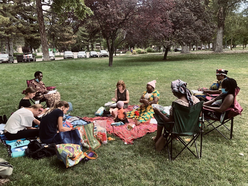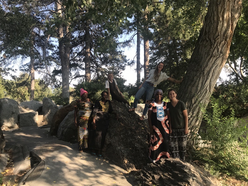With generous support from the Cambia Health Foundation, the International Rescue Committee (IRC) in Salt Lake City’s health empowerment program has worked to develop a more holistic approach to health with the Women’s Health & Healing Group. The group met together over six weeks this summer to focus on their holistic wellbeing outside of traditional healthcare settings.

Hannah Parrish, health empowerment coordinator, says that the group got its start as a way to conduct intensive community health promotion courses that would give refugee community members the opportunity to engage in conversations about health. The mission of the Cambia Health Foundation is achieving “whole-person health,” which means understanding the social determinants of health. “What you do for work, the neighborhood you live in, your access to transportation, the languages you speak… They all have influences on health,” Hannah explains. Simple things like where one lives or what they do for a living can affect how easy it is to access a doctor’s office or to take sick leave.
The Women’s Health & Healing Group sought to address health with these social determinants in mind, taking a holistic approach to key factors of overall wellbeing. “Just going on a walk with your neighbor or a friend, eating nutritious foods, or going to a church you like going to… All of these things are just as important as regularly seeing the doctor,” Hannah says. The first group was made up of five Congolese women, but Hannah hopes to do more groups with different demographics in the future.
Over the six weeks, the group addressed different topics that affect their wellbeing, such as one’s social network, nutrition, and exercise. They would meet at a park in the evenings, which Hannah says was something all of the women mentioned enjoying. “We chose the park as the location because we wanted it to be a healing environment, and we wanted it to be a discussion-based group,” Hannah says, noting that gathering in a conference room could lead to a teacher-student environment that might hinder the participants’ engagement in the discussion and providing insight to their barriers or concerns about health.
During the week focusing on nutrition, the group discussed various home remedies that can help boost immunity against common illnesses. They discovered that many of the remedies that the women were familiar with in Africa were also accessible here in the U.S. “They used lemons and limes a lot when they get sick, but they just didn’t know that we have that here also,” Hannah remembers.

The group meetings resulted in a number of positive outcomes. After walking around the park with the group, the women shared that they feel more comfortable going on walks in their own neighborhood, too. One woman, who hasn’t been able to receive treatment for a rare condition, found access to the same natural remedies that she treated her symptoms with before coming to the U.S.
The group also provided the women with a sense of community. Hannah recalls one woman who came to the U.S. alone and experienced physical symptoms due to the emotional and mental toll. “Just connecting with the other women in the group, and meeting other people that speak her language, has improved her health dramatically,” Hannah says.
Looking ahead, Hannah is excited to continue holding the group with different demographics. “I really see it as a psychosomatic support group, helping clients mentally, emotionally, spiritually, and physically. Using that space to address – like the Cambia Health Foundation says – whole-person health,” she says.
The IRC in Salt Lake City is grateful for generous support from partners like the Cambia Health Foundation. To learn more about how your organization or community group can partner with the IRC in Salt Lake City, visit our local Partner Engagement Hub »
